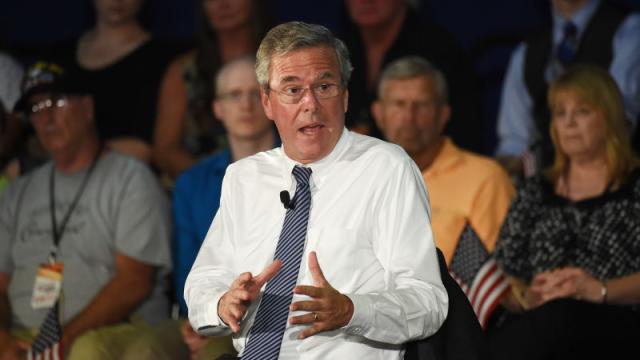United States presidential hopeful Jeb Bush just published a love note to big business that would be amusing, if it didn’t give me second-hand embarrassment at witnessing a governor so explicitly express his adoration for corporatism.
AU Editor’s Note: This story is from our cousins at Gizmodo US and covers a US-centric topic, but given the power that the United States more generally has over the entire Internet, we thought it was worth sharing. — Cam
Bush wants to get rid of unnecessary government regulations. In making his argument against various rules, he tends to play up the idea that regular folks get a contact rash from red tape.
One of Bush’s most well-suckled objets d’amour: Large internet service providers. Back in March, Bush called net neutrality regulations “one of the craziest ideas I’ve ever heard.” He has not changed his mind on the campaign trail. Railing against what he calls a “regulators-know-best mentality,” Bush endorses a plan to put the power back where he feels it really belongs, with companies like Comcast. Companies know best!!
His anti-regulation blog post features a section outlining why he finds net neutrality objectionable. Here it is, sentence-by-sentence:
The Federal Communications Commission’s Net Neutrality rule classifies all Internet Service Providers (ISPs) as “public utilities,” subjecting them to antiquated “common carrier” regulation.
The FCC’s rule does classify ISPs as public utilities, and it applies the Communications Act of 1934 to do so. Calling it “antiquated” is surly, but not inaccurate.
Rather than enhancing consumer welfare, these rules prohibit one group of companies (ISPs) from charging another group of companies (content companies) the full cost for using their services.
The FCC’s rule change does not set rates, prohibiting companies from charging a certain amount of money for their services. The rule enhances consumer welfare by protecting people from slimy tactics like throttling.
Instead of viewing the FCC’s net neutrality rule as recognised the need to protect consumers from unfettered, exploitative ISP policies, and this stance is extreme.
Small broadband operators — like KWISP (475 customers in rural Illinois) and Wisper ISP (8,000 customers near St. Louis, Mo) — have declared under penalty of perjury that the Net Neutrality rule has caused them to cut back on investments to upgrade and expand their networks.
An odd thing to highlight. While small ISPs like KWISP and Wisper have made statements indicating that the reclassification of broadband as a utility deterred them from investing in their networks, other small ISPs vocally supported the FCC’s reclassification. Casting net neutrality as a menace to small businesses is a tactic at odds with reality. Sprint’s CEO Marcelo Claure, for instance, said that the net neutrality rule would help it compete against larger providers like AT&T and Verizon.
Small broadband operators only control a small portion of the market, and companies like Comcast, Time Warner Cable, AT&T, and Verizon have such limited competition that they can keep internet prices jacked up for consumers in the US, even at slower speeds than other countries.
In his blog post, Bush also rails against “onerous” regulations to stop companies from fracking on federal land, and EPA regulations that make industrial farmers first ask permission before dumping pesticides into water. He doesn’t just want to roll back net neutrality regulations — he wants to roll back as many regulations that stymy corporate aggression as he can.
“Things happen when real people are able to act,” Bush writes. But he is not advocating for fewer laws infringing on civil liberties. He is not advocating for compassionate anarchism. He is advocating for a government that gives companies more freedom than people.
In Bush’s world, slavish alignment with big business interests is no problem as long as the message sounds enough like “small government.”
That’s not an exceptional quality in a American political candidate. And neither is couching plans to unchain businesses from enforceable consequences in language that makes it sound like those changes would be good for ordinary people. But it is a dangerous one.
Image: AP/Rainier Ehrhardt
